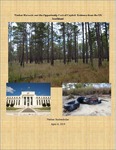Timber Harvests and the Opportunity Cost of Capital: Evidence from the US Southland (thesis)

View/
Author
Richendollar, Nathan
Subject
Washington and Lee University -- Senior Thesis in Economics
Timber -- Economic aspects -- Mathematical models
Logging -- Economic aspects -- Mathematical models
Metadata
Show full item recordDescription
Thesis; [FULL-TEXT FREELY AVAILABLE ONLINE] Nathan Richendollar is a member of the Class of 2019 of Washington and Lee University. The optimal timber rotation problem appears in many introductory environmental economics textbooks and has been a standard illustration of the relation between market rates of return and economic decision-making for decades. Thinking of optimal timber harvests as maximizing the value of timber by harvesting when marginal benefit of additional growth no longer exceeds opportunity cost dates at least to the 1700s, when William Marshall of England applied such thinking to oak trees. In the twentieth century, Irving Fischer formalized the optimal timber harvest problem with mathematics in his book The Theory of Interest, in 1930. Since then, myriad papers have considered the problem as well, contending that various factors such as harvesting cost, replanting cost, risk premiums for insect infestation, or the opportunity cost of the land's alternate uses should be included in an optimization equation. But rarely has Fisher's assumption faced empirical scrutiny. Using data from the southern US state of Alabama furnished by that state's forestry commission and county-level analysis of several other US South states, this paper finds that short-run fluctuations in market rates of return have no effect on timber harvester's decision-making process.